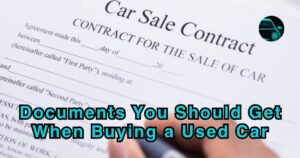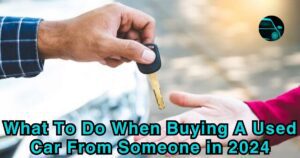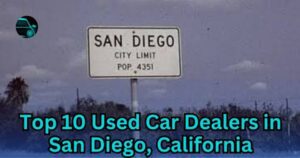Unveiling the Best 10 Things to Do When Buying a Used Car in California: Welcome to the world of used car buying in the Golden State, where navigating the vibrant market demands a strategic approach. This guide promises to be your compass in the realm of pre-owned vehicles, ensuring that your purchase is not only exciting but also smart and well-informed.
California, with its diverse landscapes and bustling cities, offers a plethora of used cars waiting for their next owners. However, the road to acquiring the perfect vehicle requires careful planning and consideration. In this comprehensive guide, we delve into the essential steps every savvy car buyer should take to make the process seamless and rewarding.
From researching the vehicle’s history to understanding the legalities of the California market, these ten key considerations are in your arsenal for a successful used car purchase. Join us as we explore the Best 10 Things to Do When Buying a Used Car in California, empowering you to confidently navigate the car-buying journey in this vibrant and dynamic state. Ready to find your dream car while enjoying the California sunshine? Let’s dive in!
Things To Do When Buying A Used Car In California
1. Check Vehicle History Report: Uncover the Past
When embarking on the adventure of buying a used car in California, one of the paramount steps is to check the vehicle history report. This document unveils the past life of the car, from accidents to title issues, offering a comprehensive view that guides your decision. Ensuring a thorough examination of the vehicle’s history is a crucial step in securing a reliable and trouble-free ride in the diverse landscapes of the Golden State. Don’t just buy a car; invest in peace of mind by uncovering its past with a detailed vehicle history report. Services like Carfax or AutoCheck can provide detailed reports to help you make an informed decision.
2. Verify the Vehicle Identification Number (VIN): Confirm Identity
When delving into the process of buying a used car in California, don’t overlook the significance of verifying the Vehicle Identification Number (VIN). This unique code serves as the car’s identity, providing crucial details about its origin, specifications, and history. Confirming the VIN ensures that the vehicle aligns with its documentation, preventing potential scams and fostering a transparent transaction. In the dynamic market of California, where choices abound, confirming the car’s identity through its VIN is a key step in making a confident and informed purchase.
3. Ensure Smog Certification: California Emission Standards
Navigating the California used car market involves more than just a test drive; ensure the vehicle meets the state’s stringent emission standards. A crucial step in this process is obtaining a valid smog certification. California takes environmental responsibility seriously, and as a buyer, ensuring the car complies with the state’s emission standards not only aligns with eco-conscious practices but also prevents potential legal hassles. Prioritize a smooth transaction by confirming the vehicle’s compliance with California’s stringent emission standards through a valid smog certification.
4. Check for Outstanding Recalls: Safety First
Safety should be paramount when purchasing a used car in California. As part of your due diligence, check for any outstanding recalls on the vehicle. Ensuring that the car has addressed any safety-related recalls not only safeguards you and your passengers but also adheres to California’s commitment to road safety. Before finalizing your purchase, make it a priority to verify the recall status, promoting a secure and worry-free driving experience in your newly acquired California vehicle.
5. Understand the California Lemon Law: Consumer Protection

Familiarize yourself with the California Lemon Law, a vital aspect of buying a used car in the state. This consumer protection law protects buyers against purchasing vehicles with hidden defects. Understanding the intricacies of the California Lemon Law ensures you have the necessary knowledge and recourse in case your used car turns out to be a lemon. Prioritize this step for a confident and informed purchase, aligning with California’s commitment to safeguarding consumers in the used car market.
6. Get a Pre-Purchase Inspection: Professional Assessment
Ensure a stress-free purchase by investing in a pre-purchase inspection when buying a used car in California. This professional assessment provides a thorough examination of the vehicle, uncovering potential issues that might not be visible to the untrained eye. Prioritizing a pre-purchase inspection aligns with California’s emphasis on consumer protection, offering you peace of mind and confidence in your used car investment.
7. Obtain the Bill of Sale: Legal Confirmation

When buying a used car in California, securing the bill of sale is a crucial step for legal confirmation. This document serves as tangible proof of the transaction, outlining the terms and conditions of the sale. Ensuring you have a comprehensive bill of sale aligns with California’s commitment to transparency and protects your rights as a consumer.
8. Complete the Notice of Transfer and Release of Liability (REG 138): Legal Protection
As a vital step when purchasing a used car in California, don’t forget to complete the Notice of Transfer and Release of Liability (REG 138). This form ensures legal protection by officially notifying the Department of Motor Vehicles (DMV) that you’re no longer responsible for the vehicle. This essential document safeguards you from potential liabilities associated with the car after the sale.
9. Check Vehicle Registration Fees: Budgeting Consideration
When embarking on the journey of buying a used car in California, it’s crucial to check the vehicle registration fees. This consideration is paramount for budgeting purposes, ensuring that you’re fully aware of the associated costs beyond the initial purchase. Familiarizing yourself with these fees contributes to a transparent and well-informed decision-making process, aligning your expectations and financial planning with the total cost of ownership.
10. Secure Insurance: Immediate Coverage
When buying a used car in California, don’t forget to secure insurance for immediate coverage. This step ensures that you’re legally protected and can hit the road with confidence. Having insurance in place is not only a requirement but also a proactive measure to safeguard your investment and provide financial protection in case of unforeseen events. It’s a vital component of the car-buying process, offering peace of mind as you embark on your journey with your newly acquired vehicle.
Conclusion: A Successful Used Car Purchase in California

In conclusion, embarking on the journey to buy a used car in California can be a smooth and rewarding experience when armed with the knowledge of the Best 10 Things to Do When Buying a Used Car in California. This comprehensive guide has shed light on the essential steps that any conscientious buyer should take to ensure a successful and hassle-free purchase.
By emphasizing factors such as researching the vehicle history, securing financing beforehand, and engaging in a thorough inspection, this guide serves as a valuable companion for California car buyers. Your car-buying journey becomes a strategic process, enabling you to navigate the complexities of the market and make informed decisions.
As you prepare to enter the dynamic used car market in California, keep these ten key considerations in mind. Whether you’re a seasoned car buyer or a first-timer, following these steps ensures that you not only find the right vehicle but also make a purchase that aligns with your needs and preferences. With the Best 10 Things to Do When Buying a Used Car in California as your guide, you’re well-equipped to drive away in your ideal used car while enjoying peace of mind. Happy car shopping!
Frequently Asked Questions
Q1: Why is a smog certification important when buying a used car in California?
A smog certification is essential in California due to the state’s stringent emission standards. It confirms that the vehicle complies with environmental regulations, and obtaining it is a prerequisite for registering the vehicle in the state.
Q2: What is the Notice of Transfer and Release of Liability (REG 138) form, and why should I submit it?
The Notice of Transfer and Release of Liability (REG 138) form is submitted to the California DMV within five days of selling a vehicle. This form releases the seller from liability for the vehicle after the sale, providing legal protection and ensuring that any future issues are not attributed to the seller.
Q3: How does the California Lemon Law protect buyers of used cars?
The California Lemon Law provides consumer protection for individuals who purchase or lease defective vehicles. While used cars are generally sold “as-is,” the Lemon Law can apply if the vehicle has significant defects that were not disclosed at the time of purchase. Buyers may be entitled to remedies, such as a refund or replacement, under certain conditions.
Q4: Can I negotiate the vehicle registration fees when buying a used car in California?
Vehicle registration fees in California are set by the state and are based on factors such as the vehicle’s value, weight, and the location where it will be registered. While the fees themselves are not negotiable, being aware of them beforehand helps buyers budget effectively for the overall purchase.
Q5: Is a pre-purchase inspection necessary when buying a used car in California?
A pre-purchase inspection is highly recommended when buying a used car in California. It allows a qualified mechanic to assess the vehicle for any hidden issues and provides the buyer with valuable information about the car’s overall condition. This inspection helps buyers make informed decisions and avoid potential problems down the road.




